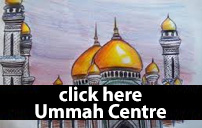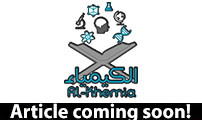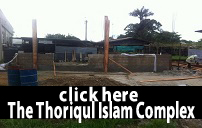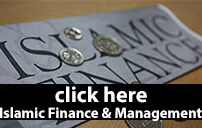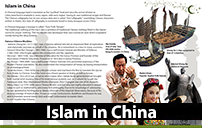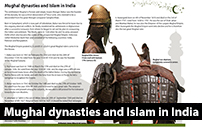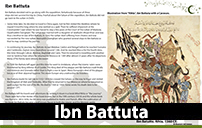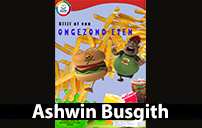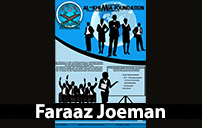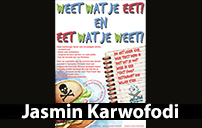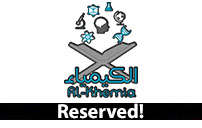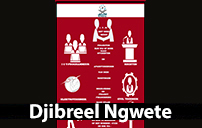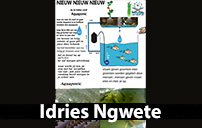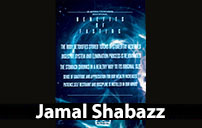-
Al-Khemia Introduction
Al-Khemia Foundation (AKF) is a non-sectarian, non-political organization which seeks to empower the Caribbean Ummah through education, science and economic development regardless of race, color and creed. AKF also strives for unity amongst the Caribbean and worldwide Ummah and therefore does not represent or is based upon a particular branch of Islam nor does it represent any political party.
Al-Khemia Foundation activities include:
• Educational Programs
• Economic Development
• Networking Communities
Read MoreImportant News
1AugInnovation in agriculture
Al-Khemia Foundation implements a range of innovative agricultural methods. The methods are designed to solve very common problems of small and medium-sized farmers in the tropics.
16JunRead MoreAl-Khemia Foundation (AKF) is building its third aquaponics system
Al-Khemia Foundation (AKF) is building its third aquaponics system (Starnieuws). Under the Agro Engineering Program, AKF has developed the Aquaponics Learning Installation (ALI) which ended its pilot fase this week.
Article: Revival of Science in the Islamic World
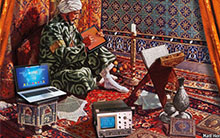
In 2005 Harvard University produced more scientific papers than 17 Arabic-speaking countries combined. That’s 20% of the Islamic world. The world’s 2.2 billion Muslims have produced only two Nobel laureates in chemistry and physics.
Read More -
About Us
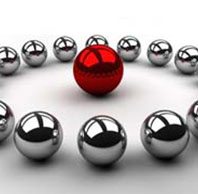
Al-Khemia Foundation is headquartered in Paramaribo, Suriname. It has a branch in Guyana and is planning to open a branch in Trinidad & Tobago. It consists of 3 board members and a scientific advisory council (Shura). Its members and supporters are as diverse as the Ummah and are spread all over the world. Al-Khemia has three classification of activities. Local (in country), regional (Caribbean) and International. Most projects center around local initiatives. Through our social media network Al-Khemia tries to draw in those willing to contribute to a better Ummah.
Board Members
Back
Chairman: Anwar Alibux. Born December 12th 1982. Studied Chemical Engineering, 2002-2007. Owner of Bux Engineering and entrepreneur.
Treasurer: Iref Joeman. Born January 13th 1986. Studied Mechanical Engineering, 2005-2013. Vice-Director of Al-Khemia. Responsible for day-to-day operation of projects and programs, communications and networking.
Secretary: Jamal Shabazz(Jermaine Sporkslede). Born May 30th 1983. Studied psychology and languages, 2008-2011. Director of Al-Caribi Global. Specializes in marketing, fundraising and strategic business development.
Shura Members
- Indra Dwarkasing: Human Behavior & Education Specialist, Educator.
- Nasir Alibux: Corporate & Legal Advisor
- Nusrat Khan: MD Student, Carpenter. Part of Al-Khemia Guyana.
- Faa’izah Mustafa: Law Student, Women's Rights. Part of Al-Khemia Guyana.
- Ismael Muhammed: Community Coordinator. Part of Al-Khemia Guyana.
- Ibrahiem Ligori: Board member of ESAV (Indigenous Platform). Historian. -
Categories
Categories
Education Summary
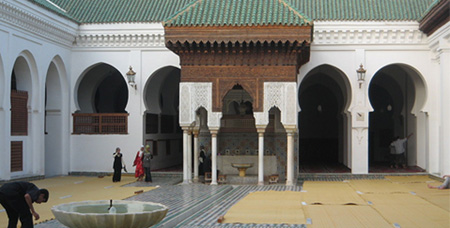
One of the most essential aspects of development is education. With the use of education, the Arab Peninsula was elevated into a believing nation which was blessed with guidance and served as a light for the world. From the first Divine instruction of Allah swt:
“Read! In the name of your Rabb (Cherisher and Sustainer) Who created— created man, out of a leech-like clot: Read! And your Rabb is Most Bountiful Who has taught (the use of) pen. He has taught man that which he knew not.” (Qur’an, 96:1-5)
This instruction was followed by the Muslims and ushered in several eras of highly developed societies. Great achievements were made through education and science. From the fountain pen to vaccination. Islamic Science also changed the social structure of other cultures. The renaissance and reformation in Europe were heavily influenced by Islamic Science and Education. Human rights, women rights, international law. Sharia has influenced more than most people realize. All the academia in the world have gotten their degrees at universities, inspired in turn by mosques as educational centers in the 1st and 2nd century AH (7th and 8th century CE).
Al Khemia endeavors to bring lost history back to people and give them a future based on science, education and compassion.
Funds & Finance
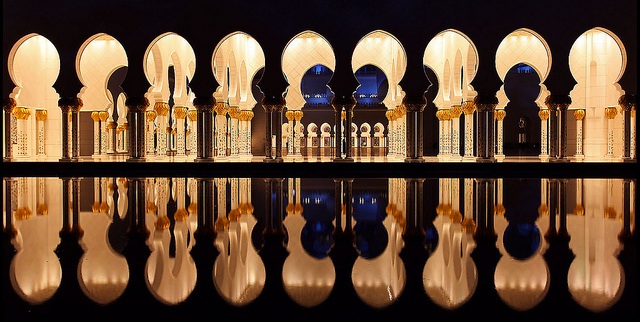
The Al-Khemia Foundation actively supports the creation of an Islamic Economic System(IES). With a minority Muslim population in the Caribbean and Latin America our first priority is to create awareness about Islamic Finance and Sharia compliant banking. AKF is the first regional center for Islamic Finance in Latin America.
To accelerate inclusion with the global IES, AKF has partnered with the International Institute of Islamic Economics & Entrepreneurial Development, IIIEED. Based in India with branches in Dubai and London this institute excels in Islamic Finance Education. Introductory and advanced courses are already available. You can download our Islamic Finance summary presentation in the gallery page. Further collaboration are sought after within the MENA region, ASIA and Latin America.
AKF also seeks to network and collaborate businesses & entrepreneurs wishing to invest based on Sharia values. AKF is a leading partner within the Caribbean Latin Economic Muslim Association (CLEMA). CLEAMA is also used to network professionals and services to companies and support Waqf projects.
AKF has been active with Islamic Finance since its inception in 2014. Waqf-loans have been granted to the needy and small loans granted to small startup companies within the AKF and CLEMA network.
To learn more about our educational programs regarding Islamic Finance please visit our Education & Science pages. Our Partner page will tell you more about CLEMA. If you can’t find what you are looking for please feel free to contact us.
BackAl-Khemia Articles
-
Aug'16
- 1-aug-16 \ Innovation in agriculture
- 12-jun-16 \ Al-Khemia Foundation (AKF) is building its third aquaponics system
- 17-may-16 \ First Islamic Finance education center opens in Suriname. A regional first.
- 16-may-16 \ Al-Khemia shall provide studies in Islamic Finance | Starnieuws
- 16-may-16 \ Introduction studies in Islamic Finance | GFC Nieuws
- 13-feb-16 \ Islamic call on rich countries to end fossil fuel use
- 12-feb-16 \ Singapore-based scientist wins top science and technology award of Islamic world
- 11-feb-16 \ Revival of Science in the Islamic World
Jun'16
May'16
Feb'16
BackCategories
Partners
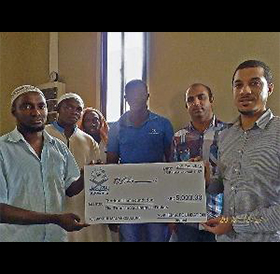
Al-Khemia’s mission is to serve the global ummah in scientific, economic and educational ways. Any organization, company or individual regardless of their location who is able to cooperate in those categories is more than welcome to join
Al-Khemia as a partner.
A few of our Partners:
Caribbean Latin Economic Muslim Association (CLEMA). CLEMA’s aim is to connect Muslim Business and Entrepreneurs worldwide and thus in doing so stimulating the local economies and promoting brother and sisterhood within the ummah.
Bux Engineering. BE is the leading engineering bureau of the AKF network. Often providing services for free for Waqf projects and at reduced costs for CLEMA members. BE specializes in agro-engineering, food processing, environmental, health, safety & quality, metal work and construction.
Samarja Foundation. The leading environmental NGO of Suriname which is now also active in Guyana. Specializes in everything from education to recycling.
Al-Caribi Global LLC. A trade & brokerage company.
Thoriqul Islam. Part of the Islamic Federation of Suriname Thoriqul Islam has a heavy focus on community activity and organizes the annual Islamic Awareness week.
Indigenous Platform(ESAV). ESAV is a young and dynamic organization that fights for the rights and culture of Indigenous people. With support from AKF, ESAV is working on their own website, archive/database and exhibition.
BackContact Info
Al-Khemia
Zwartenhovenbrugstraat #202
Phone:
Mobile:
Email:(+597)- 471331
(+597) - 8933344
info@alkhemia.orgOur Location
Contact Form
Revival of Science in the Islamic World
In 2005 Harvard University produced more scientific papers than 17 Arabic-speaking countries combined. That’s 20% of the Islamic world. The world’s 2.2 billion Muslims have produced only two Nobel laureates in chemistry and physics. Both moved to the West: the only living one, the chemist Ahmed Hassan Zewail, is at the California Institute of Technology. By contrast Jews, outnumbered 100 to one by Muslims, have won 79. The 57 countries in the Organization of the Islamic Countries spend a puny 0.81% of GDP on research and development, about a third of the world average. America, which has the world’s biggest science budget, spends 2.9%; Israel (Occupied Palestine) lavishes 4.4%.
Many universities are timid about courses that touch even tangentially on politics or look at religion from a non-devotional standpoint. Pervez Hoodbhoy, a renowned Pakistani nuclear scientist, introduced a course on science and world affairs, including Islam’s relationship with science, at the Lahore University of Management Sciences, one of the country’s most progressive universities. Students were keen, but Mr Hoodbhoy’s contract was not renewed when it ran out in December 2013; for no proper reason, he says. (The university insists that the decision had nothing to do with the course content.) But look more closely and two things are clear. A Muslim scientific awakening is under way. And the roots of scientific backwardness lie not with religious leaders, but with secular rulers, who are as stingy with cash as they are lavish with controls over independent thought. Islamic Science is after all the root of most modern Sciences.The long view
The caricature of Islam’s endemic backwardness is easily dispelled. Between the eighth and the 13th centuries, while Europe stumbled through the dark ages, science thrived in Muslim lands. The Abbasid caliphs showered money on learning. The 11th century “Canon of Medicine” by Ibn Sena(Avicenna, pictured, with modern equipment he would have relished) was a standard medical text in Europe for hundreds of years. In the ninth century Muhammad al-Khwarizmi laid down the principles of algebra, a word derived from the name of his book, “Kitab al-Jabr”. Al-Hasan Ibn al-Haytham transformed the study of light and optics. Abu Raihan al-Biruni, a Persian, calculated the earth’s circumference to within 1%. And Muslim scholars did much to preserve the intellectual heritage of ancient Greece; centuries later it helped spark Europe’s scientific revolution. Islamic Science has been directly linked to the reformation (Martin Luther’s protestant reformation) and the Renaissance. Had the Nobel prize existed then, it would have gone mostly to Muslims every year for 600 years. Not only were science and Islam compatible, but religion could even spur scientific innovation. Accurately calculating the beginning of Ramadan (determined by the sighting of the new moon) motivated astronomers. The Hadith (the sayings of Muhammad) exhort believers to seek knowledge, “even as far as China”.
Back Read NextRevival of Science in the Islamic World
These scholars’ achievements are increasingly celebrated. Tens of thousands flocked to “1001 Inventions”, a touring exhibition about the golden age of Islamic science, in the Qatari capital, Doha, in the autumn. More importantly, however, rulers are realizing the economic value of scientific research and have started to splurge accordingly. Saudi Arabia’s King Abdullah University of Science and Technology, which opened in 2009, has a $20 billion endowment that even rich American universities would envy. Even outside of Islamic centers “Science & Islam” has become popular. Like the Al-Khemia Exhibits in Suriname and Guyana (Caribbean). Foreigners are already on their way to Islamic learning centers. Jean Fréchet, who heads research, is a French chemist tipped to win a Nobel prize. The Saudi newcomer boasts research collaborations with the universities of Oxford and Cambridge, and with Imperial College, London. The rulers of neighboring Qatar are bumping up research spending from 0.8% to a planned 2.8% of GDP: depending on growth, that could reach $5 billion a year. Research spending in Turkey increased by over 10% each year between 2005 and 2010, now more than twice that of Norway’s.
The tide of money is bearing a fleet of results. In the 2000 to 2009 period Turkey’s output of scientific papers rose from barely 5,000 to 22,000; with less cash, Iran’s went up 1,300, to nearly 15,000. Quantity does not imply quality, but the papers are getting better, too. Scientific journals, and not just the few based in the Islamic world, are citing these papers more frequently. A study in 2011 by Thomson Reuters, an information firm, shows that in the early 1990s other publishers cited scientific papers from Egypt, Iran, Jordan, Saudi Arabia and Turkey (the most prolific Muslim countries) four times less often than the global average. By 2009 it was only half as often. In the category of best-regarded mathematics papers, Iran now performs well above average, with 1.7% of its papers among the most-cited 1%, with Egypt and Saudi Arabia also doing well. Turkey scores highly on engineering. While Singapore and Maleysia do well in nanotechnology and biotechnology.Science and technology-related subjects, with their clear practical benefits, do best. Engineering dominates, with agricultural sciences not far behind. Medicine and chemistry are also popular. Value for money matters. Fazeel Mehmood Khan, who recently returned to Pakistan after doing a PhD in Germany on astrophysics and now works at the Government College University in Lahore, was told by his university’s vice-chancellor to stop chasing wild ideas (black holes, in his case) and do something useful. Islamic Science focuses heavily on direct development and improvement of life. Fundamental Science is still trailing behind wester countries. Science is even crossing the region’s deepest divide. In 2000 SESAME, an international physics laboratory with the Middle East’s first particle accelerator, was set up in Jordan. It is modelled on CERN, Europe’s particle-physics laboratory, which was created to bring together scientists from wartime foes. At SESAME Israeli scientists work with colleagues from places such as Iran and the Palestinian territories.
Back Read NextRevival of Science in the Islamic World
By the book
Elementary Science of the kind practiced at SESAME throws up few challenges to Muslim doctrine. Physics and cosmology is clearly supported by the Quran. But biology—specifically with an evolutionary angle—is different. Many Muslims are troubled by the notion that humans share a common ancestor with apes. Research published in 2008 by Salman Hameed of Hampshire College in Massachusetts, a Pakistani astronomer who now studies Muslim attitudes to science, found that fewer than 20% in Indonesia, Malaysia or Pakistan believed in Darwin’s theories. In Egypt it was just 8%. But the barrier is not insuperable.
Evolution as a theory was first proposed by a Muslim scholar, Al-Jazari 1000 years before Darwin was born. It was thought in schools in the Islamic world up until the fall of the Ottoman Empire. Support for evolution can be found in the Quran. Religious scholars believe the adversity to evolution is a remnant of western colonialism in education. Acceptance of evolution is increasing year by year in Muslim societies. Especially higher educated Muslims find it acceptable. In contrast to higher educated Christians who have to acknowledge the discrepancy with their faith or turn atheist altogether. Plenty of Muslim biologists have managed to reconcile their faith and their work. Fatimah Jackson, a biological anthropologist who converted to Islam, quotes Theodosius Dobzhansky, one of the founders of genetics, saying that “nothing in biology makes sense except in the light of evolution”. Science describes how things change; Islam, in a larger sense, explains why, she says. Other parts of the life sciences, often tricky for Christians, have proved unproblematic for Muslims.
In America researchers wanting to use embryonic stem cells (which, as their name suggests, must be taken from human embryos, usually spares left over from fertility treatments) have had to battle pro-life Christian conservatives and a federal ban on funding for their field. But according to Islam, the soul does not enter the fetus until between 40 and 120 days after conception—so scientists at the Royan Institute in Iran are able to carry out stem-cell research without attracting censure. But the kind of freedom that science demands is still rare in the Muslim world. In such important countries as Egypt, some fear that it could be eroded further still. Others, however, remain hopeful. Ex-president Muhammad Morsi, is a former professor of engineering at Zagazig University, near Cairo. He has a PhD in materials science from the University of Southern California (his dissertation was entitled “High-Temperature Electrical Conductivity and Defect Structure of Donor-Doped Al2O{-3}”). He promised that his government would spend more on education and research right before he was toppled by the far less educated (US/Israel supported) al-Sisi. Education has since gotten even less attention.
Back Read NextRevival of Science in the Islamic World
Released from the restrictive control of the former regimes, scientists in Muslim countries see a chance for progress. Scientists in Tunisia say they are already seeing promising reforms in the way university posts are filled. People are being elected, rather than appointed by the regime. The political storms shaking the Middle East could promote not only civil liberties, but revive scientific freethinking, too. The rest of the Islamic world is already well under way to catch-up. More needs to be done to network Muslim scholars and universities. Most importantly, governments need to spend the proper amount on education and science needs to come back to the mosques from where it originated.
Anwar Alibux Al-Khemia Foundation.
BackAl-Khemia Foundation (AKF)
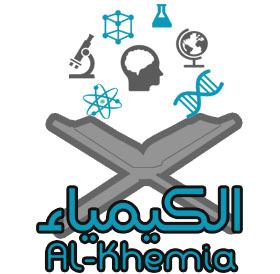
Al-Khemia Foundation (AKF) is a non-sectarian, non-political organization which seeks to empower the Caribbean Ummah through education, science and economic development regardless of race, color and creed. AKF also strives for unity amongst the Caribbean and worldwide Ummah and therefore does not represent or is based upon a particular branch of Islam nor does it represent any political party.
Al-Khemia Foundation activities include:
• Educational Programs
• Economic Development
• Networking Communities
Al-Khemia Foundation members consist of scientist, engineers, intellectuals with mostly (but not limited to) a Muslim background from various parts of the Caribbean (and the world). These members strive together to empower the Caribbean and worldwide Ummah with educational, sustainable and economic development projects.
Throughout the Muslim Golden Ages the Muslims enriched the World through unity, equality and justice. During these times the Muslims excelled in education, science and commerce. It is upon these Fundamentals that the Al-Khemia Foundation bases its principals and in doing so striving to contribute to Caribbean society in the highest manner.
“Read! In the name of your Rabb (Cherisher and Sustainer) Who created— created man, out of a leech-like clot: Read! And your Rabb is Most Bountiful Who has taught (the use of) pen. He has taught man that which he knew not.” (Qur’an, 96:1-5)
With unity as one of Al-Khemia Foundations strongest pillars, Al-Khemia Foundation is open for cooperation and contribution from all Islamic denominations but not excluding other organizations, individuals with similar visions regardless of race, color or creed.
‘’And hold firmly to the rope of Allah all together and do not become divided.’’ (Qur’an 3:103)
BackInnovation in agriculture
Latin America/Caribbean/Suriname: Aug 01, 2016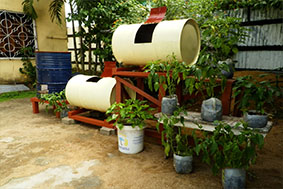
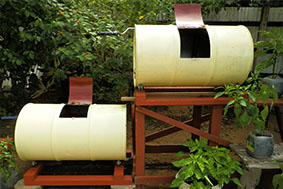
Al-Khemia Foundation implements a range of innovative agricultural methods. The methods are designed to solve very common problems of small and medium-sized farmers in the tropics. The methods are also intended primarily for the population to serve as a social economic project, where the ordinary citizen with a small plot of land can earn extra income as a micro agricultural entrepreneur.
"After each downpour you hear is that someone’s crops have been lost. In tropical agriculture water drainage is the half of your worries." Says Jamal Shabazz, coordinator of Agro Engineering and member of the board of Al-Khemia. The pepper, paprika and tomato plantation occurs at Al-Khemia wholly through containers such as PET bottles, jerrycans and buckets. There is also exclusive use of homemade compost from self designd compost barrels. No artificial nutrients or pesticides are used.
In the first test crop there were 20 paprika plants. This gave an average of four fruits per plant. Good for a turnover of USD$60,-. The total invested labor from preparation to harvest was 15 hours spread over 8 weeks. The containers are free to obtain from household consumption, the compost is made via the kitchen and/or garden waste of one household. Collected rainwater was used for watering the plants. Gardening without a garden with a turnover of $ 4.- per hour. Very good for local(Surinamese) standards. The burning sun and heavy rains of the last few months had no negative effect on the cultivation. With this method of gardening you can also manually move the plants in or out of the sun and rain. "Regardless of high-tech you want to go, we are still dependent on a climate and an economy which is disrupted. By producing organic and using innovation we increase our food -reliability, -safety and we improve our economic situation. "
Back Next PageInnovation in agriculture
Agro Engineering team is now working on a worm farm. These are used in the compost process, and also for the production of humus, an organic fertilizer. Worm humus is called “black gold” in other countries, where it is very expensive. Besides the production of humus, the worms can be processed into fish feed in different Aquaponics Systems of Al-Khemia.
People who want to learn more about agricultural innovations can visit www.alkhemia.org for lessons and tutorials.
BackAl-Khemia Foundation (AKF) is building its third aquaponics system
Latin America/Caribbean/Suriname:June 12, 2016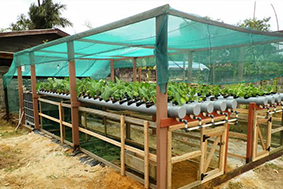
Al-Khemia Foundation (AKF) is building its third aquaponics system (Starnieuws). Under the Agro Engineering Program, AKF has developed the Aquaponics Learning Installation (ALI) which ended its pilot fase this week. The ALI combines aquaculture, greenhouse farming, hydroponics, composting and poultry with maximum efficiency on a small surface (18m2). The ALI is designed to teach people ‘’integrated urban agriculture” techniques. This is agriculture for people who live in urban areas or people who do not have large surface area’s to farm. Ducks, tilapia and also other local freshwater fish as well as lettuce and celery can be produced in this integrated system. The ALI is the 2nd system which the Al-Khemia Foundation has designed and built, the 3rd system is currently being constructed en will produce on a commercial scale. Non-skilled people will now easily be able to build, maintain and repair the system with the ALI. Manuals developed by AKF will be provided to deal with common issues such pest control, feeding and maintenance. The ALI has over 1000 liters of fish ponds with 60 fish, 340 plants and 6 ducks. The ALI will also be utilized to experiment with different flora and fauna on a scientific level. With plants ranging from papaya, paprika, pepper to celery, lettuce and citrus grass. The growth process of these plants will observed, logged and analyzed to determine optimum growing conditions. Future systems in development will be tuned to certain types of flora which require equal feeding and sunlight for their growth process. Everything learned at ALI will be implemented in future models.
By the 1 st of December there will be 6 operating Al-Khemia urban agriculture systems, all shall be located on different locations within Greater-Paramaribo(Suriname) under the supervision of AKF member/partners. Visitors are welcome every Friday afternoon to view, enquire, and also order the system. The ALI is built besides the mosque of the Thoriqul Islam Foundation.
The current worsening economic situation in Suriname are reminiscent of the nineties economic woes. Now, like then, there is concern about food security. Contrary to popular belief Suriname does not have a significant agriculture economy.
Back Read MoreAl-Khemia Foundation (AKF) is building its third aquaponics system
There are large swathes of fertile land but unfortunately 70% of the population do not have access to arable land. The people who do have agricultural land are generally not occupied with agriculture and the people who do want to do farming are not able to afford to buy or rent the land. Most of the population do have a backyards. With maximum utilization just 6 to 10m2 of free surface you can produce 30-60 fish, 100+plants, 6-10 ducks or chicken. The fish and poultry can be culled every 3 months and the vegetables every week or month depending on the crop. Food safety is also of great importance, the Agro Engineering Program does not work with pesticides and also limits the use of chemical fertilizer and synthetic/processed food supplements. An organic certification will be issued for the household and commercial installations which are affiliated with the Al-Khemia Foundation. The Samarja Foundation, Bux Engineering and Al-Caribi Global LLC have contributed with knowledge, material and finance for the Agro Engineering Program of the Al-Khemia Foundation.
BackFirst Islamic Finance education center opens in Suriname. A regional first.
Latin America/Caribbean/Suriname: May 17, 2016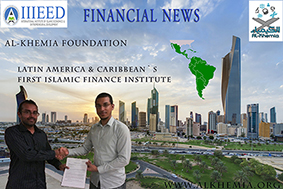
Since January 2016 the Al-Khemia Foundation has been upgrading its Education & Science Program. Courses and training range from math lessons and welding to software coding and advanced graphical design. Islamic Finance is now also available. As the interest in Islamic finance has been growing globally, it has also ignited interests within the region. Suriname and Guyana are members of the Islamic Development Bank. In 2014 Al-Khemia began to explore the world of Sharia Compliant Banking and Islamic Financing. There is little knowledge and experience in the Caribbean & Latin America about this fast growing branch of the financial world. To make up for the lack of expertise contact was made with the International Institute of Islamic Economics & Entrepreneurial Development, IIIEED. A respected educational Institute settled in Bangaluru, India, specialized in Islamic Finance. In 2013 IIIEED began to expand its network outside of India and currently has offices in Dubai (UAE) and London (United Kingdom). Because of the relatively small Caribbean economy and population, Al-Khemia will also function as a regional center for representing IIIEED. The MoU lays out the steps to be taken to implement standards and curriculum in order to provide courses/lectures on par with a university educational level. This process could take until the end of 2017. In the meanwhile the basics courses can begin as early as June. With this Al-Khemia has become the first educational institute which specializes in Islamic Financing within the Caribbean region and the whole of Latin America.
IIIEED was represented by Jamal Shabazz(pictured right)to sign the MoU with Mr. Anwar Alibux, Chairman of Al-Khemia. The Education & Science program of Al-Khemia has expanded its staff with specialists, academics and engineers to provide a total of 19 courses and training programs. Aside from IIIEED, there also has been contact with Universities from Malaysia, Pakistan, Turkey and Belgium.
BackIslamic call on rich countries to end fossil fuel use
By Matt McGrath
Environment correspondent, BBC News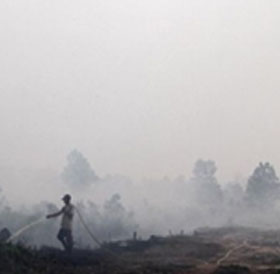
Islamic environmental and religious leaders have called on rich countries and oil producing nations to end fossil fuel use by 2050. The Islamic Climate Declaration says that the world's 1.6bn Muslims have a religious duty to fight climate change. It urges politicians to agree a new treaty to limit global warming to 2C, "or preferably 1.5 degrees." The Declaration asks Muslims, in the words of the Koran, "not to strut arrogantly on the Earth".
Drafted at an international symposium in Istanbul, the Declaration calls for "all people, leaders and businesses ...to commit to 100% renewable energy".It also argues for increased financial support for communities vulnerable to climate change. The main focus though is on "well-off nations and oil-producing states," who are urged to lead the way in phasing out greenhouse gases, no later than the middle of this century.
The Declaration calls on the rich countries, to recognise their "moral obligation to reduce consumption so that the poor may benefit from what is left of the Earth's non-renewable resources". "People need to be told and politicians need to stop misleading their people, in telling them they can go on increasing their standards of living for ever and ever and ever," Fazlun Khalid, a long time Islamic environmentalist involved in drawing up the Declaration, told BBC News. "Someone should be articulating this because it's an impossibility, they can't do it - And this applies not just to Muslim countries." The call has been supported by religious leaders including the Grand Muftis of Uganda and Lebanon, the president of Indonesia's major body of religious scholars as well as environmental groups and government officials from Morocco and Turkey.
But critics have argued that the Declaration is not truly representative of Islam with some of the biggest Islamic nations not taking an active part in supporting the call. "Are all Islamic countries represented? I'd say no to that - that's the honest answer," said Fazlun Khalid. "There is a huge amount of lethargy - we are not set up like other churches, there is no Islamic pope! "The Declaration is like a trigger - to say, wake up wherever you are, wake up and take care of the Earth."
Back Read MoreIslamic call on rich countries to end fossil fuel use
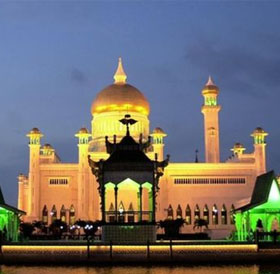
The Declaration comes in the wake of Pope Francis's encyclical on the environment and climate change, which was seen as a significant call for Catholics to engage on the issue of global warming. Catholic leaders have praised the Islamic Declaration as a positive step. "It is with great joy and in a spirit of solidarity that I express to you the promise of the Catholic Church to pray for the success of your initiative and her desire to work with you in the future to care for our common home and thus to glorify the God who created us," said Cardinal Peter Turkson, who helped the Pope draft his encyclical. The authors of the Declaration say that it will be available in mosques and madrassas around the world. They hope that it will influence political leaders in Muslim countries to become more fully involved in global attempts to deliver a new treaty on climate change, expected to be signed in Paris in December.
While around 50 countries have so far posted their plans for curbing climate change ahead of the meeting in Paris, very few Muslim countries have been among them. I asked Fazlun Khalid if religious divisions between Muslims were a bigger issue at present than climate change. "In spite of their differences we want Muslims to wake up and think and realise that this is a problem that affects every inch of this planet, in spite of their differences, under their feet something is happening, a deep plate shift in the Earth's crust," he said. "In spite of our differences we have to take this on, as the major issue affecting the whole of the human world."
BackSingapore-based scientist wins top science and technology award of Islamic world
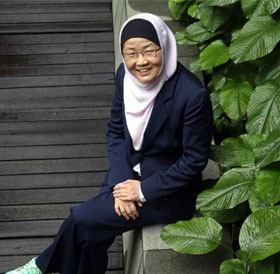
SINGAPORE - A Singapore-based scientist has won the top science and technology award of the Islamic world, which comes with a $700,000 cash prize. Professor Jackie Ying, 49, executive director of the Institute of Bioengineering and Nanotechnology (IBN), will be awarded the inaugural Mustafa Prize in the Top Scientific Achievement category on Friday (Dec 25), in a ceremony to be held in Teheran, Iran. This prize is meant for individuals whose research has improved human life and "expanded the boundaries of our perception about the world".
Among her numerous scientific contributions, Prof Ying was recognised in particular for her role in developing glucose-sensitive nanoparticles that deliver insulin to diabetic patients only when their blood glucose levels are high. The system does away with external blood glucose monitoring by fingerpricks, and allows insulin to be delivered orally or by the nasal passage, instead of through injections. Professor Hossein Zohour, head of the scientific committee of the Mustafa Prize, said the groundbreaking research is "an outstanding scientific approach of great promise for improving the quality of life of mankind in the near future". The other top award winner, under the Nano Science and Nanotechnologies category, was Jordanian chemist Omar Yaghi, co-director of the Kavli Energy NanoSciences Institute at the University of California, Berkeley.
The pair edged out 600 other nominees, including Nobel laureates and scientists in the top of their fields. The Mustafa Prize recognises leading researchers and scientists of the Organisation of Islamic Cooperation (OIC) member states, and Muslim researchers from around the world. Prof Ying, who was born in Taipei, and raised in Singapore and New York, converted to Islam in her 30s. She told The Straits Times that she intends to use a portion of the prize money to get more students intrigued about science, such as through exchange trips to renowned overseas science institutions and better-equipped school laboratories. She will start her effort at her alma mater Raffles Girls' School.
BackRevival of Science in the Islamic World
In 2005 Harvard University produced more scientific papers than 17 Arabic-speaking countries combined. That’s 20% of the Islamic world. The world’s 2.2 billion Muslims have produced only two Nobel laureates in chemistry and physics. Both moved to the West: the only living one, the chemist Ahmed Hassan Zewail, is at the California Institute of Technology. By contrast Jews, outnumbered 100 to one by Muslims, have won 79. The 57 countries in the Organization of the Islamic Countries spend a puny 0.81% of GDP on research and development, about a third of the world average. America, which has the world’s biggest science budget, spends 2.9%; Israel (Occupied Palestine) lavishes 4.4%.
Many universities are timid about courses that touch even tangentially on politics or look at religion from a non-devotional standpoint. Pervez Hoodbhoy, a renowned Pakistani nuclear scientist, introduced a course on science and world affairs, including Islam’s relationship with science, at the Lahore University of Management Sciences, one of the country’s most progressive universities. Students were keen, but Mr Hoodbhoy’s contract was not renewed when it ran out in December 2013; for no proper reason, he says. (The university insists that the decision had nothing to do with the course content.) But look more closely and two things are clear. A Muslim scientific awakening is under way. And the roots of scientific backwardness lie not with religious leaders, but with secular rulers, who are as stingy with cash as they are lavish with controls over independent thought. Islamic Science is after all the root of most modern Sciences.The long view
The caricature of Islam’s endemic backwardness is easily dispelled. Between the eighth and the 13th centuries, while Europe stumbled through the dark ages, science thrived in Muslim lands. The Abbasid caliphs showered money on learning. The 11th century “Canon of Medicine” by Ibn Sena(Avicenna, pictured, with modern equipment he would have relished) was a standard medical text in Europe for hundreds of years. In the ninth century Muhammad al-Khwarizmi laid down the principles of algebra, a word derived from the name of his book, “Kitab al-Jabr”. Al-Hasan Ibn al-Haytham transformed the study of light and optics. Abu Raihan al-Biruni, a Persian, calculated the earth’s circumference to within 1%. And Muslim scholars did much to preserve the intellectual heritage of ancient Greece; centuries later it helped spark Europe’s scientific revolution. Islamic Science has been directly linked to the reformation (Martin Luther’s protestant reformation) and the Renaissance. Had the Nobel prize existed then, it would have gone mostly to Muslims every year for 600 years. Not only were science and Islam compatible, but religion could even spur scientific innovation. Accurately calculating the beginning of Ramadan (determined by the sighting of the new moon) motivated astronomers. The Hadith (the sayings of Muhammad) exhort believers to seek knowledge, “even as far as China”.
Back Read NextRevival of Science in the Islamic World
These scholars’ achievements are increasingly celebrated. Tens of thousands flocked to “1001 Inventions”, a touring exhibition about the golden age of Islamic science, in the Qatari capital, Doha, in the autumn. More importantly, however, rulers are realizing the economic value of scientific research and have started to splurge accordingly. Saudi Arabia’s King Abdullah University of Science and Technology, which opened in 2009, has a $20 billion endowment that even rich American universities would envy. Even outside of Islamic centers “Science & Islam” has become popular. Like the Al-Khemia Exhibits in Suriname and Guyana (Caribbean). Foreigners are already on their way to Islamic learning centers. Jean Fréchet, who heads research, is a French chemist tipped to win a Nobel prize. The Saudi newcomer boasts research collaborations with the universities of Oxford and Cambridge, and with Imperial College, London. The rulers of neighboring Qatar are bumping up research spending from 0.8% to a planned 2.8% of GDP: depending on growth, that could reach $5 billion a year. Research spending in Turkey increased by over 10% each year between 2005 and 2010, now more than twice that of Norway’s.
The tide of money is bearing a fleet of results. In the 2000 to 2009 period Turkey’s output of scientific papers rose from barely 5,000 to 22,000; with less cash, Iran’s went up 1,300, to nearly 15,000. Quantity does not imply quality, but the papers are getting better, too. Scientific journals, and not just the few based in the Islamic world, are citing these papers more frequently. A study in 2011 by Thomson Reuters, an information firm, shows that in the early 1990s other publishers cited scientific papers from Egypt, Iran, Jordan, Saudi Arabia and Turkey (the most prolific Muslim countries) four times less often than the global average. By 2009 it was only half as often. In the category of best-regarded mathematics papers, Iran now performs well above average, with 1.7% of its papers among the most-cited 1%, with Egypt and Saudi Arabia also doing well. Turkey scores highly on engineering. While Singapore and Maleysia do well in nanotechnology and biotechnology.Science and technology-related subjects, with their clear practical benefits, do best. Engineering dominates, with agricultural sciences not far behind. Medicine and chemistry are also popular. Value for money matters. Fazeel Mehmood Khan, who recently returned to Pakistan after doing a PhD in Germany on astrophysics and now works at the Government College University in Lahore, was told by his university’s vice-chancellor to stop chasing wild ideas (black holes, in his case) and do something useful. Islamic Science focuses heavily on direct development and improvement of life. Fundamental Science is still trailing behind wester countries. Science is even crossing the region’s deepest divide. In 2000 SESAME, an international physics laboratory with the Middle East’s first particle accelerator, was set up in Jordan. It is modelled on CERN, Europe’s particle-physics laboratory, which was created to bring together scientists from wartime foes. At SESAME Israeli scientists work with colleagues from places such as Iran and the Palestinian territories.
Back Read NextRevival of Science in the Islamic World
By the book
Elementary Science of the kind practiced at SESAME throws up few challenges to Muslim doctrine. Physics and cosmology is clearly supported by the Quran. But biology—specifically with an evolutionary angle—is different. Many Muslims are troubled by the notion that humans share a common ancestor with apes. Research published in 2008 by Salman Hameed of Hampshire College in Massachusetts, a Pakistani astronomer who now studies Muslim attitudes to science, found that fewer than 20% in Indonesia, Malaysia or Pakistan believed in Darwin’s theories. In Egypt it was just 8%. But the barrier is not insuperable.
Evolution as a theory was first proposed by a Muslim scholar, Al-Jazari 1000 years before Darwin was born. It was thought in schools in the Islamic world up until the fall of the Ottoman Empire. Support for evolution can be found in the Quran. Religious scholars believe the adversity to evolution is a remnant of western colonialism in education. Acceptance of evolution is increasing year by year in Muslim societies. Especially higher educated Muslims find it acceptable. In contrast to higher educated Christians who have to acknowledge the discrepancy with their faith or turn atheist altogether. Plenty of Muslim biologists have managed to reconcile their faith and their work. Fatimah Jackson, a biological anthropologist who converted to Islam, quotes Theodosius Dobzhansky, one of the founders of genetics, saying that “nothing in biology makes sense except in the light of evolution”. Science describes how things change; Islam, in a larger sense, explains why, she says. Other parts of the life sciences, often tricky for Christians, have proved unproblematic for Muslims.
In America researchers wanting to use embryonic stem cells (which, as their name suggests, must be taken from human embryos, usually spares left over from fertility treatments) have had to battle pro-life Christian conservatives and a federal ban on funding for their field. But according to Islam, the soul does not enter the fetus until between 40 and 120 days after conception—so scientists at the Royan Institute in Iran are able to carry out stem-cell research without attracting censure. But the kind of freedom that science demands is still rare in the Muslim world. In such important countries as Egypt, some fear that it could be eroded further still. Others, however, remain hopeful. Ex-president Muhammad Morsi, is a former professor of engineering at Zagazig University, near Cairo. He has a PhD in materials science from the University of Southern California (his dissertation was entitled “High-Temperature Electrical Conductivity and Defect Structure of Donor-Doped Al2O{-3}”). He promised that his government would spend more on education and research right before he was toppled by the far less educated (US/Israel supported) al-Sisi. Education has since gotten even less attention.
Back Read NextRevival of Science in the Islamic World
Released from the restrictive control of the former regimes, scientists in Muslim countries see a chance for progress. Scientists in Tunisia say they are already seeing promising reforms in the way university posts are filled. People are being elected, rather than appointed by the regime. The political storms shaking the Middle East could promote not only civil liberties, but revive scientific freethinking, too. The rest of the Islamic world is already well under way to catch-up. More needs to be done to network Muslim scholars and universities. Most importantly, governments need to spend the proper amount on education and science needs to come back to the mosques from where it originated.
Anwar Alibux Al-Khemia Foundation.
BackUmmah Centre

Suriname is a young nation of 40 years gaining its independence in 1975. The young republic has a diverse population with a relative high percentage of Muslims. With 14.5% of the total population giving Suriname the right to be called the country with the most Muslims in ratio compared to others countries in the America’s.The republic of Suriname is also a member of the OIC and is the first country from the Western hemisphere to be part of this organization.
The Al-Khemia foundation shares the dream and vision with other local and regional Muslim organizations of establishing a multifunctional Science & Education Center. Dubbed the Ummah Center. The purpose of this center is to provide an elementary and secondary school education as well as laboratory and other facilities for the regional population. Besides the secular sciences being taught in these schools, religious teachings and Quran recitation will also be taught to the pupils of the school. The Ummah Center will contribute to the scientific and economic development of the region. Producing highly qualified and well educated Muslim doctors, engineers, imams, economists etc. will make the Ummah in the Caribbean stronger and represented in every influential sector of society. The future prospective professionals who graduate from the Ummah Center will function as positive role models for Muslims as well for non-Muslims. Suriname and some parts of the Caribbean are relatively underdeveloped with an inadequate educational system. Many people have forgotten their roots and heritage. The youth of these nation needs positive role models, the same accounts for many Muslim youth who are being exposed to increasing islamophobia in media and politics.
The Ummah Center will be a multifunctional center which will include the following facilities:
• Chemical Laboratory: The chemical lab will be one of the highest standards and technology in the Caribbean and South-America, and will serve as a center of technological advancement, research and technological innovation. Focus on Water and Food quality.
• Medical Laboratory: The medical lab will deliver high quality research and serve the needs of the community and thus improve health standards in the region.
Back Read NextUmmah Centre
• ICT/ Electro/ Communication: In this “Age of Information” Computer, Electronic and Communication technology is of utmost importance for community development. The Ummah Center will provide research and development of the ICT/Electro/Communication sector.
• Stellar Observatory: During the Islamic Golden Age, scientists pioneered and excelled in the area of Astronomy, the center will honor this tradition by including an observatory to study the cosmos.
• Elementary School: The center will include an elementary school to provide the basics for a science and engineering inclined youth.
• Secondary School: The center will include a secondary school to continue to shape the minds of the future generation of scientists, leaders and productive members of society.
• Offices: The center will include a full function business center to stimulate economic growth in the region and promote and facilitate cooperation and entrepreneurial initiatives within the Ummah.
BackAl-Khemia Agro Engineering
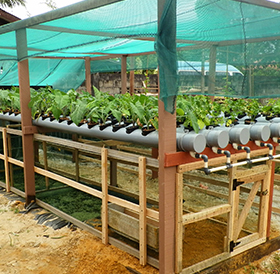
One of the worlds growing problems is food scarcity, according to statistics* the world needs to produce 50% more food to feed 9 billion people by 2050. This growing problem is further exacerbated by the fact that world resources are depleting fast.
Al-Khemia Foundation’s vision of social economic development strives to contribute in reducing this problem through the Al-Khemia Agro Engineering Program which consist of food production efficiency projects. Low surface, high yield agriculture is ideal for urban areas as a means to tackle both rising food prices, unemployment and environmental damage from common agriculture practices. Fruit gardens, poultry, hydroponics are just some of the Agro Engineering program.
One exiting part of the Al-Khemia Agro Engineering Program is Aquaponics.
Aquaponics is an ancient system which utilizes maximum efficiency out of space and water for growing crops and simultaneously growing fish. The system is highly sustainable in urban areas and can be used with a renewable energy source. The system is a symbiotic self-supporting system whereby the fish enrich the water with fertilizing manure. The fish tank is connected to a hydroponics system which feeds the plant who thrive on fish manure. The plants, in turn, contribute to the purification of the water for the fish. Currently Al-Khemia is developing 2 separate aquaponics farms at a private residence and an Islamic Organization. See map.
Interested parties can contact Al-Khemia for any agricultural project, from home hobbies up to commercial scale agriculture.
http://www.worldbank.org/en/topic/foodsecurity/overview#1 BackAl-Khemia Agro Engineering

Al-Khemia Foundation (AKF) is building its third aquaponics system. Under the Agro Engineering Program, AKF has developed the Aquaponics Learning Installation (ALI) which ended its pilot phase this week. The ALI combines aquaculture, greenhouse farming, hydroponics, composting and poultry with maximum efficiency on a small surface (18m2). The ALI is designed to teach people ‘’integrated urban agriculture” techniques. This is agriculture for people who live in urban areas or people who do not have large surface areas to farm. Ducks, tilapia and also other local freshwater fish as well as lettuce and celery can be produced in this integrated system. The ALI is the 2nd system which the Al-Khemia Foundation has designed and built, the 3rd system is currently being constructed en will produce on a commercial scale. Non-skilled people will now easily be able to build, maintain and repair the system with the ALI. Manuals developed by AKF will be provided to deal with common issues such pest control, feeding and maintenance. The ALI has over 1000 liters of fish ponds with 60 fish, 340 plants and 6 ducks. The ALI will also be utilized to experiment with different flora and fauna on a scientific level. With plants ranging from papaya, paprika, pepper to celery, lettuce and citrus grass. The growth process of these plants will observed, logged and analyzed to determine optimum growing conditions. Future systems in development will be tuned to certain types of flora which require equal feeding and sunlight for their growth process. Everything learned at ALI will be implemented in future models.
By the 1st of December there will be 6 operating Al-Khemia urban agriculture systems, all shall be located on different locations within Greater-Paramaribo(Suriname) under the supervision of AKF member/partners. Visitors are welcome every Friday afternoon to view, enquire, and also order the system. The ALI is built besides the mosque of the Thoriqul Islam Foundation.
Back Read MoreAl-Khemia Agro Engineering
The current worsening economic situation in Suriname are reminiscent of the nineties economic woes. Now, like then, there is concern about food security. Contrary to popular belief Suriname does not have a significant agriculture economy. There are large swathes of fertile land but unfortunately 70% of the population do not have access to arable land. The people who do have agricultural land are generally not occupied with agriculture and the people who do want to do farming are not able to afford to buy or rent the land. Most of the population do have a backyards. With maximum utilization just 6 to 10m2 of free surface you can produce 30-60 fish, 100+plants, 6-10 ducks or chicken. The fish and poultry can be culled every 3 months and the vegetables every week or month depending on the crop. Food safety is also of great importance, the Agro Engineering Program does not work with pesticides and also limits the use of chemical fertilizer and synthetic/processed food supplements. An organic certification will be issued for the household and commercial installations which are affiliated with the Al-Khemia Foundation. The Samarja Foundation, Bux Engineering and Al-Caribi Global LLC have contributed with knowledge, material and finance for the Agro Engineering Program of the Al-Khemia Foundation.
BackAl-Khemia Building Systems
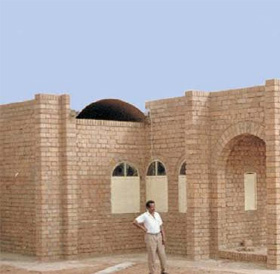
One of human beings basic needs alongside food and water is shelter. A rising population is increasing the demand for affordable housing.
Al-Khemia Building Systems studies and implements building technology that balances humanities needs while addressing environmental concerns. The Al-Khemia Building Systems focuses on local building material, prefabrication and environmental design principles.
Our first project is to build an agricultural warehouse followed by a small house to develop the system. This program is expected to begin in the 4th quarter of 2016. The budget is USD$25,000.- , of which USD$5,000.- has already been secured. If successful Al-Khemia building system can evolve into a commercial enterprise.
Right now Al-Khemia is looking for volunteers, building engineers and investors who want to join the program. Please contact us for any question, remarks or interest in participation.
BackInnovative Building Materials
Humans produce a lot of waste. Arguably “waste” is the primary product of every civilization throughout history and none have produced as much waste as the current consumer-capitalist societies. A lot of this waste still has value for some, either by re-use or recycling. Building materials have become increasingly expensive worldwide. Standardization and commercialization have forced people to overlook building innovation and alternatives. At AKF Building Systems we experiment with discarded materials to produce effective and new building materials and products (IBM’s).
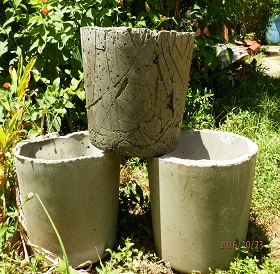
Carbon-Cement
Foundations and walling are often made with specifications beyond requirements. This also applies to garden and house ornaments made from concrete/cement. Carbon or activated carbon is heavily used in the food industry as a water or air purifier. Waste carbon can be repurposed to produce cheaper and lighter garden ornaments and plant holders. Up to 30% by volume of sand (aggregate) can be replaced with carbon granules. The result is a lighter, cheaper and environmentally responsible plant holder.
Back Read NextInnovative Building Materials
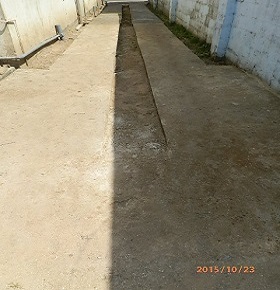
Glass Foundation
Glass is expensive to recycle and potentially awkward/dangerous to repurpose. At AKF we crush and pulverize glass bottles and light bulbs. The cullet is then mixed into foundation cement of structures, driveways and walls. Up to 25% of the AKF driveway is made up of crushed TL-lighting tubes. The drive way is capable of holding 2 ton axis light trucks without any tears or damage showing. As a precaution the dust and gasses that are released from crushing light bulbs and TL-lighting tubes are filtered to remove harmful substances like mercury dust and fine particulate glass.
BackThe Pikin-poika Mosque
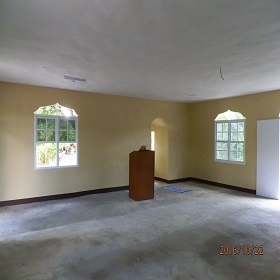
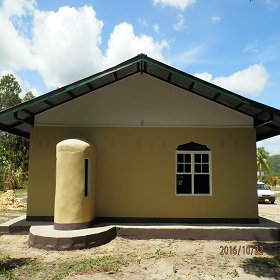
Originally built by the World Islamic Call Society in 2006 together with Mr. Hoogland, a village elder, the mosque is at the centre of the Indigenous village of Pikin-Poika. Its 150m² makes it the largest building in the village. The Al-Khemia Foundation has been the caretaker of this Mosques since the 8th of Dhu al-Hijjah, 1437 AH (September 10th 2016). The mosque has been renovated and expanded and is now also functioning as a madrassa (learning centre) and community centre. The mosque has become central to the economic, educational and agricultural development of the village and its 150 inhabitants. The mosque features automated power saving light, a rainwater collection system connected to an adjacent farm, its own well and a playground. The Pikin-poika Mosque renovation and expansion was paid for by Anuska Alibux, a member of the Al-Khemia Foundation.
BackThe Thoriqul Islam Complex
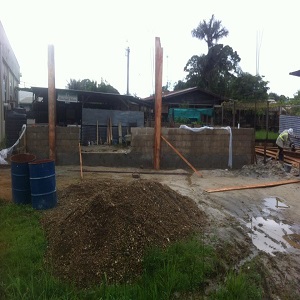
Adjacent to the Thoriqul Islam Mosque (Paramaribo), AKF has co-financed the expansion of a community hall, a kitchen and an abattoir suited for Eid al-Adha celebrations.
The expansion complex which is still under construction has been built with sustainability in mind. The complex used 2 tons of recycled glass within its foundation, Carboncrete ornaments, Aquaponics farm, seedling installation and fencing made from recycled pallet wood. The community hall has been fitted with Wi-Fi internet allowing its members to utilize the web for their studies and will soon sport a day care and a catering service.
BackAl-Khemia Off-Grid Solutions
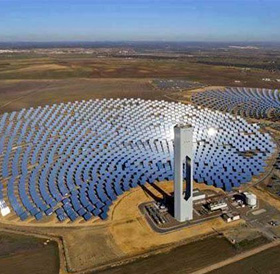
Independence and self-sufficiency makes us able to be who we want to be. Fuel and electricity prices are as volatile as the politics that govern them. An arbitrary choice by single commodity trader or politician may impact the GDP and security of whole country.
The Off-Grid program looks for ways to make communities more self-sufficient by increasing usage efficiency and producing what they need themselves. The main objective is energy. Developing Solar Thermal, Solar Electric and Hydrogen utilities is one way to become less dependent, save money and increase employment.The Off-Grid Solutions program further strives to design and develop interconnected systems of power generation, food production, communication and shelter construction. The Off-Grid program is now working on hydrogen enhanced cars and solar electric projects.
Start date: June 2016 Budget: USD$2000,- (Secured for pilot and testing phase)
For more information and participation, please contact us.
BackShagoefta Mahal Women’s Hostel
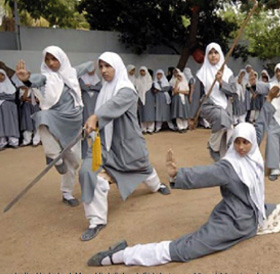
Vision
Providing an affordable, safe haven for young ladies/women in Suriname.Mission
Shagoefta Mahal means Happy Palace and is a place where young ladies/women can feel safe. Here they can rent a fully furnished room at an affordable rate.Background
Shagoefta Mahal is the initiative of Shagoefta Blenman - Joemmanbaks in collaboration with Al-Khemia Foundation.There are inadequate facilities to host and support troubled youth in Suriname, especially girls and young women. The women’s hostile is now in its design phase. Al-Khemia will manage the design and construction phase of this project. Land acquisition has already been secured for this project.The women’s only hostel will be able to host up to 25 individual rooms, 24/7 security, a therapeutic garden and a wellness center. There will be a collaboration with the ministry of health and the ministry of Justice & Police regarding this project.
BackIslam & Science Exhibition
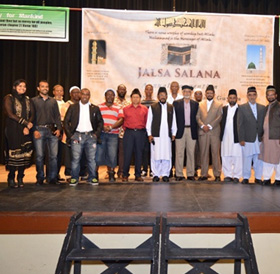
An exhibition about the achievements and contributions that Muslims have made for humanity. Started in February 2015. 6 exhibition have been held so far (Feb 2015 - December 2015) including in Guyana and the University of Suriname. About a 1000 people attended directly, a few thousand downloaded the online exhibition materials and have shared it through social media. The banners with summarized facts and graphics can be downloaded on this website. They have been shared on multiple websites across the world, posted on Facebook and printed in newspapers.
Current developments:
• Expansion of topics and added research for the exhibition and book.
• Islam & Science Documentary: Documentary that tells the story of the Muslim achievements throughout history.
• Islam & Science Educational Books: Educational book which describes the Muslim achievements throughout history, these books can be used for schools, Mosques, etc, to add to their curriculum.The Al Khemia Foundation wants to display its exhibition in various countries around the Caribbean and Latin America. Local Mosques and NGO’s are welcome to collaborate to bring the exhibition to their country. See the attached files for specifics of the exhibition.
BackScholarships for Higher Education

Scholarships are being made available for studies that directly benefit development. Al Khemia scholarships are usually combined with internships in relevant sectors. The scholarship program has been active since December 2012. A full 3 years before Al Khemia Foundation was formally created.
4 Bsc graduates and 1 Msc graduates have been delivered so far in Suriname. Plans are being made to provide the scholarships in Guyana and other Caribbean countries. 3 of our graduate students have gone on to follow international training in Japan, Trinidad & Tobago, Guyana and Jamaica.
Do you think you need the scholarships or know somebody who does? Contact Al Khemia and give us the details.
Al Khemia is also looking for contributors who would like to support students with their higher education. Full transparency will be provided to any supporter or contributor.
BackAl Khemia Science Awards

The Science Awards are an initiative of the Al Khemia Foundation to encourage scientific researches. The main purpose of this award is to increase the number of researchers, doctors, engineers and innovators within the Muslim community and Suriname as a whole. By rewarding and acknowledging; students, leaders, entrepreneurs and professionals who show exemplary achievements in the fields of science and engineering, Al Khemia endeavors to further develop the Scientific Caribbean.
If you know of anyone deserving of recognition for their work in engineering and science, you can contact Al Khemia and submit that person’s name and achievements. Please see the submission criteria for applicable candidates.
Companies and philanthropists are encouraged to support these awards.
BackResearch & Development

Al Khemia undertakes its own research and development projects. Ideas and initiatives are first researched thoroughly by a shura of engineers, scientist and innovators from different backgrounds. Many Ideas have since grown into projects, programs and education initiatives. Al Khemia is looking to have a specialist in every field imaginable. From harvesting bamboo and woodworking to genetics and cyber security. Our experts are scattered across the world as is befitting any Ummah centered organization.
Those who seek to join or council of experts or just want to pitch an idea can join us on facebook, linkedin or just send us an email.
BackCourses and Training programs

Al Khemia provides sector specific courses and training programs. These are focused and designed to benefit the specific needs for communities. Started in January 2015. Courses are given on an on-demand basis. A student / applicant may follow multiple courses with and without examination in his / her own tempo. Many courses are now free or require a low fee. Courses are given on a once a week basis, consisting of 2-3 hour lesson. Multiple lessons may be required to fulfil the course.
Available Courses & Training programs:
- COMPUTER AND NETWORKING
- • Windows & Words: Basic(1 week)
- • Windows & Words: Advanced(4 weeks)
- • Linux: Basic & Advanced(2-8 weeks)
- • Social Media Management(1 week)
- • AutoCAD 2D & 3D(6 weeks)
- • Software Development & Coding(6-12 weeks)
- • Cyber Security (6-12 weeks)
- • Graphic Design(4-6 weeks)
- • Website development(4-6 weeks)
- CONSTRUCTION
- • Welding(4 weeks)
- • Plumbing, Gas & Electric(6 weeks)
- • Masonry & Woodworking(4 weeks)
- FINANCE AND PROJECTS
- • Project Management(6-8 weeks)
- • Administration & Finance (4-6 weeks)
- • Islamic Finance & Managament(BA of 3-4 years)
- • Islam & Science (Including: History, Culture & Politics. 8 weeks)
- ENVIRONMENT AND AGRICULTURE
- • Waste Management & Recycling(2-3 weeks)
- • Agro Engineer (Horticulture, Hydro culture, Aqua culture, Composting. 8 weeks)
BackIslamic Finance & Management Islamic Finance & Management is a full time Bachelor of Arts(BA) study. The only BA given by AKF. The study consists of 242 EC credit points spread over 4 years. Depending on previous study and work experience certain course exemptions can be made. Examinations and document legalization may be required to determine this. A graduation thesis is required finalize the study. All studies will be published online. Some course material may be replaced based on student requirements and current developments. The examination & education board is made up of both AKF and non AKF members and will vary per student. Enrolment criteria requires a minimum of a high school diploma or equivalent.
- EDUCATION BOARD & LECTURERS:
- ANWAR ALIBUX, ING)
- FRANKLIN MAANSTER, ING
- NIDA KHAN, MSC
- ILLYAS PASHA, BSC
- INDRA DWARKASING, MSC
- ELAINE LANG, MOB
- JAMAL SHABAZZ
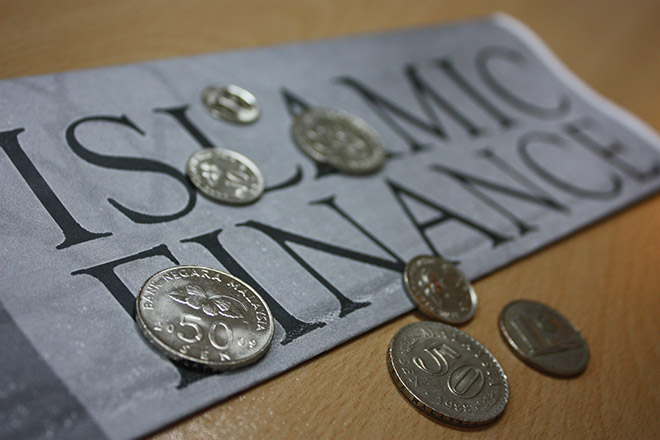 Al Khemia Foundation &
International Institute of Islamic Economics & Entrepreneurial Development
Al Khemia Foundation &
International Institute of Islamic Economics & Entrepreneurial Development
BackCourses and Training programs
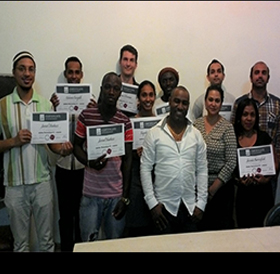
Training: Adobe Photoshop CS6
Duration: 8 Weeks
Examination: Theoretical and Practical examsCertified Students:
• Kevin Blenman • Ashwin Busgith • Rayshree Busgith • Faraaz Joeman • Jasmin Karwofodi • Mac-andrew Suleiman • Djibreel Ngwete • Idries Ngwete • Jamal Shabazz
Examination commission:
• Indra Dwarkasing, Msc.
• Ing. Iref Joeman
• Ing. Franklin MaansterThe practical exam was an infographic with a specific theme. The assignments can be viewed in the gallery section.
Back
AlKhemia 2016
